News Analysis
Lithuania, a small country of nearly 3 million people, has not caved in to Chinese pressure amid a diplomatic row over the Baltic nation’s decision to develop ties with Taiwan.

Lithuania, a small country of nearly 3 million people, has not caved in to Chinese pressure amid a diplomatic row over the Baltic nation’s decision to develop ties with Taiwan.